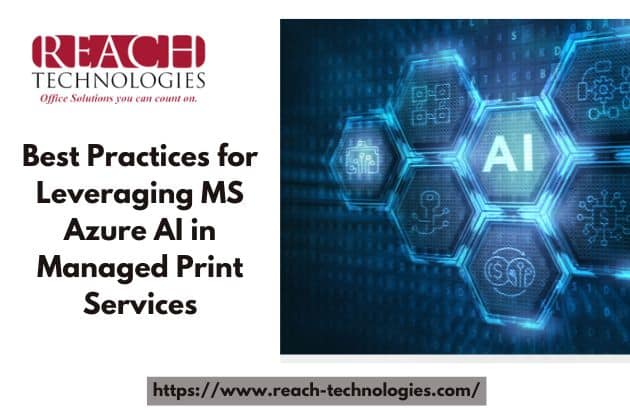
Clearly Define Objectives
Start by identifying your specific goals and objectives for implementing AI in your MPS. Whether it’s reducing operational costs, improving print fleet management, or enhancing user experience, having clear objectives will guide your AI strategy.
Data Collection and Management
High-quality data is essential for AI-driven solutions. Collect and store data from your print devices, including usage patterns, maintenance logs, and error reports. Azure provides robust data storage and management services like Azure Blob Storage and Azure SQL Database.
Data Security and Compliance
Ensure that you comply with data privacy regulations (e.g., GDPR) and implement security measures to protect sensitive print data. Azure offers tools like Azure Security Center and Azure Sentinel for monitoring and managing security threats.
Machine Learning Models
Develop machine learning models to analyze print data. Azure Machine Learning can assist in model training and deployment. Consider using Azure Databricks for more advanced analytics and model building.
Predictive Maintenance
Utilize AI to predict when print devices might fail or require maintenance. This can reduce downtime and improve device availability. Azure IoT services can be integrated for real-time monitoring and predictive maintenance.
Cost Optimization
Implement cost optimization algorithms to monitor and control print-related expenses. Azure Cost Management tools can help track and optimize resource usage.
User Experience Enhancement
Use AI to improve user experiences with features like smart printing suggestions, mobile printing, and personalized dashboards. Azure Cognitive Services can be employed for natural language processing and computer vision tasks.
Automation and Workflow Integration
Integrate AI-driven automation into your print workflows. Azure Logic Apps and Power Automate can help streamline processes and trigger actions based on AI insights.
Customer Insights
Leverage AI to gain deeper insights into customer needs and preferences. Analyze printing behavior to offer tailored services and support. Azure AI services like Azure Synapse Analytics can help with data analysis.
Scalability and Performance
Ensure your AI infrastructure on Azure is scalable to accommodate growing data and user demands. Azure Kubernetes Service (AKS) can be used for containerized AI applications.
Monitoring and Maintenance
Continuously monitor the performance of your AI models and infrastructure. Azure Monitor and Azure Application Insights provide tools for tracking system health and performance.
Training and Skill Development
Invest in training your team or hiring experts with AI and Azure expertise. Microsoft offers Azure AI certifications to validate skills and knowledge.
User Training and Support
Provide training and support to end-users to help them leverage AI-powered features effectively and maximize the benefits of your MPS.
Feedback and Iteration
Collect feedback from users and regularly iterate on your AI-powered MPS. Azure DevOps can help manage the development lifecycle efficiently.
Stay Updated
Keep up to date with the latest advancements in Azure AI and MPS technologies to stay competitive and continuously improve your services.
By following these best practices, you can effectively leverage Microsoft Azure AI to enhance your Managed Print Services, improve operational efficiency, and deliver greater value to your customers. The integration of Multifunction Printers with Microsoft Azure AI in Managed Print Services represents a powerful synergy that empowers businesses to optimize their document management, enhance security, reduce costs, and minimize their environmental impact. It’s a testament to how technology continues to evolve and reshape the way we work, making businesses more efficient, sustainable, and competitive in today’s digital age.
